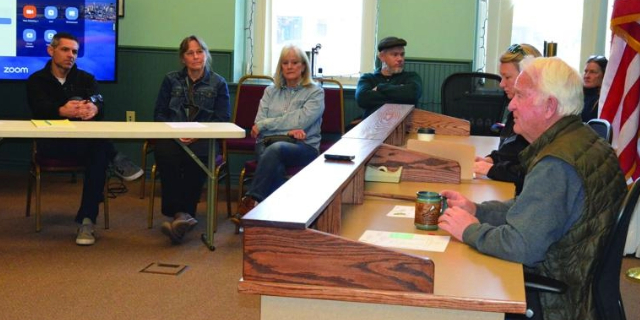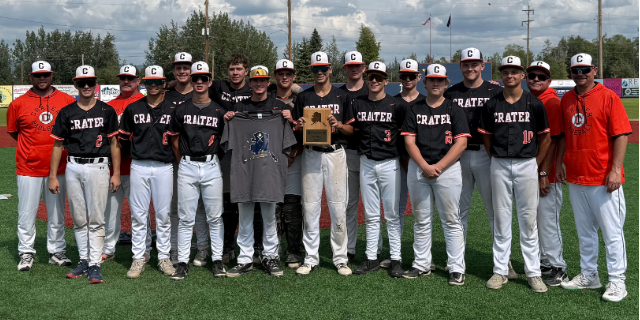Low turnout at latest Wallowa County Greater Idaho forum
Published 1:54 pm Monday, March 3, 2025

- From left, Matt McCaw, spokesman for the Greater Idaho movement, and Alicia Zinni, of Joseph, a local supporter, listen to Wallowa County Commissioners Lisa Collier and John Hillock on Feb. 26, 2025, during the most recent meeting to determine the county's best interests if it were to become part of Idaho. (Bill Bradshaw / Wallowa County Chieftain)
ENTERPRISE — Interest in discussing whether Wallowa County should become a part of Idaho appears to be waning, at least based on the number of people who showed up last week for a discussion of the issue.
Just over 30 people participated in person and online during the fourth public meeting held by the Wallowa County Board of Commissioners since the passage of a 2023 ballot measure to consider the county’s best interests if the state line should move.
In addition to two of the three county commissioners — Susan Roberts was out on sick leave — Matt McCaw was present as a spokesperson for Move Oregon’s Border for a Greater Idaho.
Legislation
But progress is being made at the state level. State Rep. Bobby Levy, R-Echo, is one of the co-sponsors of House Bill 3488, which would create a task force to study moving the Oregon-Idaho border to include some Eastern Oregon counties in Idaho. According to the state website, the bill that is now before the House Committee on Rules would document the legal and legislative processes that must take place to relocate the state boundaries. It would direct the task force to study and document the impacts of the proposed relocation on residents, businesses and other specified entities and submit a report to the legislature by Jan. 15, 2027.
One of the drivers of the Greater Idaho movement is the fact that many rural Eastern Oregonians don’t feel their concerns are being heard in Salem.
Commissioner Lisa Collier said there is hope on that front, as several bills are being considered that relegate decision-making from the state to the counties most affected.
She mentioned that Sen. Todd Nash, a former commissioner here, is co-sponsoring a bill that would allow the use of hound dogs to hunt cougars. Collier said the measure did not pass out of the Natural Resource Committee, but “that’s because of how the committee was made up.”
She said a Union County commissioner got the bill presented to the Legislative Committee as a local bill.
“It was a bill to put things back into local control in local communities,” she said.
Collier also noted that statewide votes legalizing marijuana and psilocybin allowed local jurisdictions to opt out. (Joseph opted in for marijuana. Neither Wallowa County nor any of its cities have opted in for psilocybin.)
“We need to get more things back to that level when we’re dealing with the state,” she said.
Collier urged the audience to add their two cents’ worth, even at the state level.
“So it’s important that if you really feel strongly about one of those things — or any bill — (that you) participate,” she said. “There are over 4,000 bills (before the legislature), by the way, so if anybody has time to read them, can you fill me in?”
Oregon vs. Idaho
Differences between the two states were discussed. Alicia Zinni of Joseph, a supporter of the Greater Idaho movement, sought to spell out differences in state law.
She noted that land use planning in Idaho is primarily governed at the local level, while Oregon has a statewide structure. Both states have programs for reduced property tax assessments for agricultural and timber lands.
While Oregon has urban growth boundaries to contain development, Idaho requires cities to identify areas of city impact prior to annexing. Cities and counties collaborate on setting those boundaries.
While Idaho has its 6% sales tax, smaller jurisdictions can levy additional taxes. For example, Blaine County, where Sun Valley is, adds another 3%, Zinni said.
When urged to raise the lodging tax to help pay county expenses, Commissioner John Hillock said he has gotten strong pushback from the lodging industry over any increase.
A bill that Hillock is now pushing in the legislature might allow local jurisdictions to consider moving some resource land into affordable housing land, bypassing state land use goals.
Hillock said such comparisons will be valuable in future meetings on the Greater Idaho issue.
“I think (where) things like this would be helpful is to get down to the specifics, make the comparison and understand what the choice is about,” he said. “And yes, the bill before the legislature now would form a large committee to do that, but we’re pretty far removed from Salem and all those things, so maybe we can do some of that ourselves.”
Hillock said he has owned property in both states and is not impressed with the way Idaho taxes its residents.
Idaho buying Oregon
One issue that has been brought up in the past is the amount of money Idaho would have to pay Oregon for land, public equipment, schools, hospitals and other publicly owned facilities. McCaw said people wonder how Idaho will pay for such a large portion of Oregon.
“Oregon isn’t going to let this go for free,” he said.
He mentioned a study that would look at how land and other items would be transferred between the states.
He also emphasized that while Idaho has a lower minimum wage, locals in what are now Oregon counties could vote to change that — or anything else they don’t like.
Hillock noted that meetings like this are destined to go on ad infinitum since no sunset clause was included in the original ballot measure. That would require another ballot measure — or the conclusion of an interstate compact to transfer part of Oregon to Idaho.










